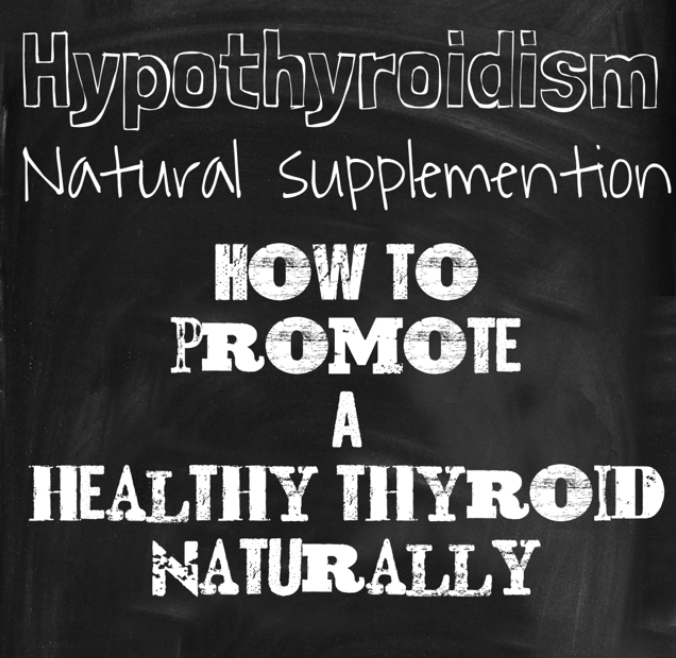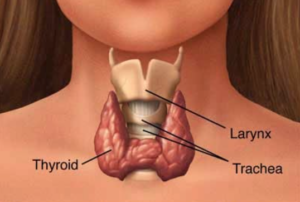Supporting a Healthy Thyroid

Hypothyroidism has plagued me for many years.
I was borderline before I was pregnant with my 1st baby.
After he was born my thyroid went crazy!
This is the WebMD explanation of what Hypothyroid is…..

Hypothyroidism means your thyroid is not making enough thyroid hormone. The thyroid is a butterfly-shaped gland in the front of your neck. It makes hormones that control the way your body uses energy.
Having a low level of thyroid hormone affects your whole body. It can make you feel tired and weak. If hypothyroidism is not treated, it can raise your cholesterol levels. During pregnancy, untreated hypothyroidism can harm your baby. But hypothyroidism can be treated with medicine that can help you feel like yourself again.
People of any age can get hypothyroidism, but older adults are more likely to get it. Women age 60 and older have the highest risk. You are more likely to get the disease if it runs in your family.
What if I told you that you really do NOT have a thyroid issue? What if I told you it was an autoimmune disease instead? I bet you are wondering how this could be. The sad fact is that up to 97% of people diagnosed with hypothyroid disease actually have an autoimmune disease. To make matter worse, you are probably on thyroid hormone replacement and not dealing with the root cause, the autoimmune disease.
In the United States, the most common cause is Hashimoto’s thyroiditis{this is what I have!). It causes the body’s immune system to attack thyroid tissue. As a result, the gland can’t make enough thyroid hormone.
The Road Map to Recovery Program teaches you exactly how to heal your thyroid and put the autoimmune disease in remission so that you can start to live a healthy, energized life again!
Signs you may have HYPOTHYROIDISM!
I have every single one of these symptom at some point in the last 20 years.
Muscle and Joint Pains, Carpal Tunnel/Tendonitis Problems – Aches and pains in your muscles and joints, weakness in the arms and a tendency to develop carpal tunnel in the arms/hands, tarsal tunnel in the legs, and plantar fasciitis in the feet can all be symptoms of undiagnosed thyroid problems.
*my carpal tunnel/tingling was so bad that I had to wear rollerblading wrist/hand guards to keep my wrist/hands supported…it was horrible.
Neck Discomfort/Enlargement –A feeling of swelling in the neck, discomfort with turtlenecks or neckties, a hoarse voice or a visibly enlarged thyroid can all be signs of a “goiter” — an enlarged thyroid gland that is a symptom of thyroid disease.
*I had a goiter on each side of my thyroid glands, now most are gone and the other is stable and has not grown in size in 5 years.
Hair/Skin Changes – Hair and skin are particularly vulnerable to thyroid conditions, and in particular, hair loss is frequently associated with thyroid issues. With hypothyroidism, hair frequently becomes brittle, coarse and dry, while breaking off and falling out easily. Skin can become coarse, thick, dry, and scaly. There is often an unusual loss of hair in the outer edge of the eyebrow.
*on top of the fact that my hair was already naturally thin, I began going bald! talk about depressing!
Bowel Problems –Severe or long-term constipation or gas painis frequently associated with hypothyroidism.
*I had no idea that I was constipated because I had the issue all my life, as far back as I can remember.
Menstrual Irregularities and Fertility Problems –Heavier, more frequent and more painful periods are frequently associated with hypothyroidism. Infertility can also be associated with undiagnosed thyroid conditions.
*My current Doctor is amazed I gave birth to two children without major deformities since my thyroid was such a mess.
Family History –If you have a family history of thyroid problems, you are at a higher risk of having a thyroid condition yourself. You may not always be aware of thyroid problems in your family, though, because, among older people, it is often referred to as “gland trouble” or “goiter.” So pay attention to any discussions of glandular conditions or goiter or weight gain due to “a glandular problem,” as these may be indirect ways of referring to thyroid conditions.
*My mother, her mother and several other maternal females in the family suffered from thyroid issues, many requiring the removal or radiation therapy to treat the disease.
Cholesterol Issues – High cholesterol, especially when it is not responsive to diet, exercise or cholesterol-lowering medication, can be a sign of undiagnosed hypothyroidism.
*This is the only one that has never been brought to buy attention from previous doctors, so I am not sure if I ever had an issue with cholesterol.
Depression and Anxiety –Depression or anxiety – including sudden onset of panic disorder – can be symptoms of thyroid disease. Hypothyroidism is most typically associated with depression, while hyperthyroidism is more commonly associated with anxiety or panic attacks.
*Obesity, childbirth, sleepless night, new mom were the reasons I was given by Doctors as to the way I was feeling!?
Weight Changes – You may be on a low-fat, low-calorie diet with a rigorous exercise program, but are failing to lose weight. Or you may have joined a diet program or support group, and you are the only one who isn’t losing any weight. Difficulty losing weight can be a sign of hypothyroidism. You may be losing weight while eating the same amount of food as usual – or even losing while eating more than normal. Unexplained weight changes and issues can be signs of both hypothyroidism or hyperthyroidism.
*2hrs at the gym, eating as healthy as I knew to eat, often going hungry and never lost anything, gained very easily. At one point I was considered morbidly obese! The Road Map to Recovery Program walks you through your new and exciting relationship with food!
Fatigue –Feeling exhausted when you wake up, feeling as if 8 or 10 hours of sleep a night is insufficient or being unable to function all day without a nap can all be signs of thyroid problems.
*Again I was told it was just lifestyle, new baby, weight gain and I was even told laziness by one (not so wonderful) Doctor!
Now I’m sure you’re asking why would taking supplements help my thyroid, my DR prescribes me thyroid meds, isn’t that enough?
The short answer is NO!
The long answer is “for some people it may be”, however for myself and everyone else I have ever met with this auto immune disease it is not.
*There are a few rules in this life, one is that if you want a different outcome, you must make a change, maybe this is the change you need, I am a new person since starting this new lifestyle which includes supplements.
I had been on high doses of Synthroid, they moved to the more “natural” version of it called Armour Thyroid, then naturthroid and even thyroid 130 for a bit. According to my labs, my thyroid was in normal range. I felt like crap! my skin, hair & nails were a mess, I was struggling with my weight, joint stiffness, always tired & irritable and the list goes on.
Adding a healthy supplement regimen, designed specifically for me, based on my needs has been the saving grace.
I’m going to mention the idea of a healthy mindset because with this disease it is very easy to give up and admit defeat. I am here to tell you that this can be reversed, you can heal it and you will feel better. I will also tell you the truth that although it is simple, it is NOT easy.
This is exactly why I designed the Road Map to Recovery for Moms. It was needed and I was driven to help other moms who may be suffering in silence like I was for years.
Want to learn more about this program? Watch this quick video to learn more.

